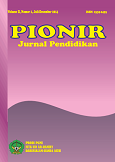EFEKTIVITAS TEKNIK SELF MANAGEMENT UNTUK MENINGKATKAN KEDISIPLINAN PESERTA DIDIK KELAS VII DI SMP ISLAM IBNU KHALDUN BANDA ACEH
DOI:
https://doi.org/10.22373/pjp.v10i1.10246Keywords:
Self Management Techniques, DisciplineAbstract
Discipline is a student's behavior that is formed through the process of a set of habits that show the values of obedience, obedience, order and order based on norm values. Students who have discipline will show obedience and regularity to their role as a student, namely students in a directed and orderly manner. This research was conducted at Ibnu Khaldun Islamic Middle School in Banda Aceh against the background of the problem of lack of students in managing time, because Ibnu Khaldun Islamic Middle School is a boarding school (dayah), therefore almost all students experience personal problems, especially on discipline. This study aims to determine self-management techniques before and after effective group guidance services are provided to improve student discipline in Ibnu Khaldun Islamic Middle School Banda Aceh. Researchers use quantitative methods and use the type of pre-experimental research (pre-experimental) with One Group Pre-test and Post-test Design. Data collection used is a Likert scale. Analysis techniques using the normality test and t-test. The population in this study were grade VII students of Ibnu Khaldun Islamic Middle School in Banda Aceh. There are 61 students with high, medium and low discipline, while the sample is 7 students representing class VII. The sample is chosen through purposive sampling with the categorization of students with the lowest level of discipline. From the results of this study it can be concluded that, the results of the study show effective self management techniques to improve the discipline of students in grade VII in Ibnu Khaldun Islamic Middle School Banda Aceh.
References
Afid Burhannuddin, Ridlo Ariesta, dkk. (2013). Metodelogi Penelitian, diakses dari situs: https://www.google.comress.com/2013/09/24/populasi-dan-sampel-4/amp.
Alwasilah, Chaedar. (2008). Dasar-dasar Melakukan Penelitian Kuantitatif, Jakarta: PT Dunia Pustaka Jaya.
Irfan Prabowo. (2012) “Teknik Pengelolahan Diri (Self Management)”. Di akses dari situs web: http://irvanhavefun.blogspot.com/2012/03/teknik-pengelolahan-diri-self-managment.html?m=1
M. Burhan Bungin. (2005). Metodelogi Penelitian Kuantitatif, Jakarta: Prenada Media Group.
Ritonga Hasnun Jauhari. (2015). Manajenmen Organisasi, Pengantar Teori dan Praktek, Medan: Perdana Publishing.
S. Margono (2005). Metodelogi Penelitian Pendidikan, Jakarta: PT Rineka Cipta.
Sugiyono (2008), Metode Penelitian Kuantitatif, Kualitatif dan R&D, Bandung: Penerbit Alfabeta.
Tohirin. (2013). Bimbingan dan Konseling di Sekolah dan Madrasah, Jakarta: PT Raja Grafindo Persada
Prama Setia, Ricky Yordani, dkk. (2016), Dasar-Dasar Statistika Dengan Software R Konsep dan Aplikasi, Bogor: Penerbit In Media.
Furqon. (2009). Statistik Terapan Untuk Penelitian, Bandung: Alfabeta.
Downloads
Published
Issue
Section
License
- Authors retain copyright and grant the journal right of first publication with the work simultaneously licensed under a Creative Commons Attribution License that allows others to share the work with an acknowledgment of the work's authorship and initial publication in this journal.
- Authors are able to enter into separate, additional contractual arrangements for the non-exclusive distribution of the journal's published version of the work (e.g., post it to an institutional repository or publish it in a book), with an acknowledgment of its initial publication in this journal.
- Authors are permitted and encouraged to post their work online (e.g., in institutional repositories or on their website) prior to and during the submission process, as it can lead to productive exchanges, as well as earlier and greater citation of published work (See The Effect of Open Access).

